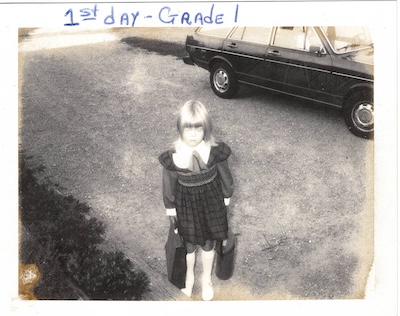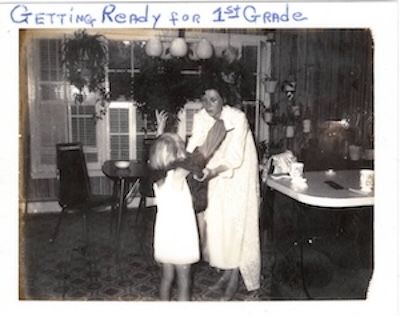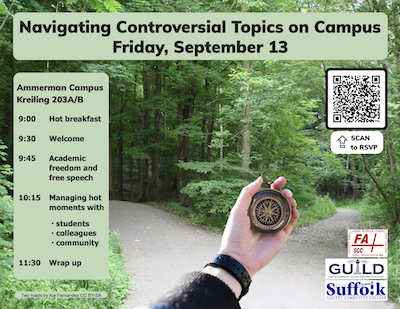September 2024
The start of the fall semester has always been a favorite time of year for me. I love the return to campus and familiar routines, the cooler weather and just the overall excitement and promise that a new academic year brings. I’ve been this way my whole life, always looking forward to the start of a new school year for as long as I can remember. I recognize, though, that not everyone shares this view in its entirety. Many people experience the end of summer through a veil of sadness, in anticipation of shorter days and cold winters. Outside of our work lives, some of us are saying goodbye to children who are off to college (a whole new set of worries) or trying to wrangle younger children into a back-to-school mindset while attempting to put into place oh-so-precariously balanced childcare situations. Many of us are caring for aging and ailing parents and feeling the terrible strain that can accompany watching people who used to be so in charge of their own lives (as well as ours) become our dependents. Political season adds to anxiety And, of course, there is the political climate that we are all too aware of as we ride this crazy roller coaster toward Election Day. Political stress is real. According to a recent Pew Charitable Trust survey, 65% of US adults always or often feel exhausted by politics and 55% always or often feel angry about it. The survey was conducted in February, but an awful lot of political drama has happened since then that may not necessarily have brought a sense of tranquility. “US adults” are the people that many of our students are living with, so they are not immune to the chaos of the current political climate, even if we don’t see our students as being particularly plugged into politics. “Political anxiety” is being explored as a unique and distinct form of anxiety, as research suggests it is being experienced by people who do not have generally high levels of anxiety overall. Anxiety, as we know, turns up the volume on our emotions and reactions and can lead to higher rates of conflict. The more time spent on social media, the higher the level of anxiety that is experienced. If there is one thing we do know about our students, it is that most of them spend a lot of time on social media. Most will tell you that social media is their primary source of news. I very rarely have any discussion of politics in my psychology classes. I have never had conflicts flare over political issues. There are, however, other things we are facing in our classrooms with the start of the semester, which could be causing our own stress levels to tick up. Many faculty are despairing over the rampant use of artificial intelligence (AI) and other “writing assistance” tools our students are so clearly making use of, wondering why in the world we spend so much time and effort creating meaningful assignments only to be handed an impeccable and publication-worthy piece of writing. That sounds like a good thing, until we then discover the student who submitted it cannot speak to or explain it in any way. We are also hearing from more faculty who are turning away from teaching online courses, feeling burnt out from having to act more like academic police than teachers. Then there is the overall angst about the future in general, as we sometimes feel we are watching the slow and agonizing death of critical thinking skills. It’s enough to make our most dedicated faculty members upset, anxious, even angry. Students nowadays Post-COVID students are also not the students many of us have been working with for so many years. Most faculty will tell you that students have indeed changed. True, faculty have been lamenting students who don’t want to work, who are caught cheating and who don’t seem to care since the dawn of formal education—but there is a new landscape out there that many of us survey with dismay. During advising, I saw students who had to text their parent for their login and password information, students who had to ask their parent what courses they should take and those who had to ask their parent to review their schedule to approve it. Every day in the parking lot I see fewer students driving themselves to campus; instead they are being dropped off and picked up. In the classroom, I am seeing what many of us are seeing; more students who are just overall less and less like the college student we remember being ourselves, plus more students with documented mental health issues. I have seen more inappropriate behaviors and oversharing of personal information as well as student expectations that are quite frankly very different from what we have seen in the past. Navigating difficult moments on campus All of this comes together to make for a higher likelihood of difficult moments both in and out of the classroom. When it happens in class, as the professor it is my job to respond appropriately, while 35 sets of eyes are staring, waiting to see what I am going to do. That never feels good. Difficult moments are, of course, not limited to the classroom. As our campus librarians can tell you, students are spending more time in the library waiting to be picked up or waiting for classes to start after being dropped off, and conflicts are increasing. Student services faculty also attest to a higher incidence of student issues, and the level of seriousness is ever increasing. I will take a moment here to say that I have also seen much kindness and understanding from students toward one another when those difficult moments happen. I have seen students volunteer to help one another find buildings on campus by walking with them, share notes when one is absent and tell me when they are concerned about another student. There is plenty of tolerance, acceptance and kindness out there. I believe the majority of our students do want to be in college, in our classrooms, working toward achieving their goals—or figuring out what those goals are. Most are willing to support one another in small ways, and most are wonderfully, even surprisingly, understanding of one another. So, yes, while the start of the new academic year brings excitement and promise to many faculty and students, there is also a lot of other stuff going on with us and with our students. We should acknowledge this and understand that it is sometimes difficult to juggle all that life entails. For one thing, understand that difficult moments can and likely will happen no matter how well you run your classroom or other workspace and that we do have the means to navigate them. The best way is to be as prepared as possible. Also know that we have resources to help us better understand what may be happening beneath the surface of what we see in our classes and offices, libraries and labs, and student centers and campus quads. We can’t fix all of the things that are making difficult moments occur more frequently. We do, however, have an opportunity to learn from one another about these “hot moments” and how to handle them. Please join us for the “Navigating Controversial Topics on Campus” workshop on Friday, 9/13, at 9:00 a.m. in Kreiling Hall Room 203A/B for a hot breakfast, some helpful information and some welcome support for all that you are navigating. |




